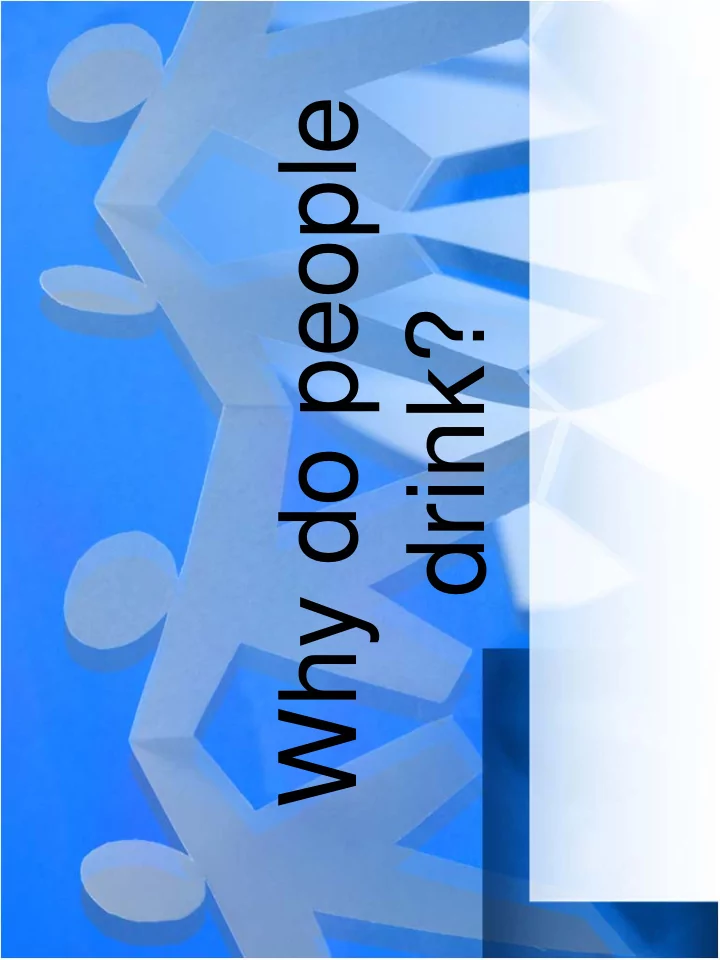

Why do people drink?
• Its It’s fun • It helps us to relax. • We may enjoy the taste • To be social. • Feel high or excited. • Peer pressure. • Experimental. • Addiction. • Dependency
• The basic reason for people drinking alcohol, which is a drug, is to vary their conscious experience .
• From an Aboriginal perspective we need to understand drinking and other drug taking in the context of colonisation and the oppression and internalised oppression our people have experienced and continue to experience.
The effects on children and community • Alcohol has a devastating impact on children in the Aboriginal community because it is socially taught by the older community; uncle’s, aunties, nanna’s pop’s ,mothers and fathers. • Cause for concern is not only for our community, but generational damages occur when alcohol and binge drinking is taught to be a normal life practice.
• Normal practices such as house work, food preparation and hunting are no longer taught, a cultural imbalance is occurring. Children then begin to learn destructive behaviours; domestic violence, anti-social behaviours, stealing and begin to own a sense of understanding that through alcohol all negative behaviours is acceptable.
• Children are often not educated, loved, nurtured, not kept safe and are shown no respect. And in Aboriginal Culture self belonging and respect are both a major part of Aboriginal culture. • Children are left to fend for themselves when the older community are more worried about alcohol. Clothing, food, money a sense of belonging are taken (stolen) rather then shown how to earn them.
What does alcohol and other drugs counselling look like. • Community development Strategies: Assess community readiness to change • ( stage of change model) • Healing and empowerment workshop or community meeting that can support the community to identify issues and provide the community with information to assist them to make an informed decision
• Identify the issues • Identify the target groups • Identify community members who wish to commit to the process • Develop an action plan (this will include identifying resources) • Take action • Keep it going • Assess and evaluate
Approaches to address alcohol problems from a community level (Factors that support Sustainability) • Community relevance: The project must be relevant to the needs and concerns of the community. Then the community will find a way of carrying on a project without outside funding and guidance. • Community and cultural values: The project must take into account local values and culture. Community members must be involved in developing ideas, goals, use of language that reflects their values.
• Key leader support: The support of community leaders is crucial. • To make a project last, local leaders must give active and visible support. • Local staff: Action groups should have locally resident workers. They can keep projects alive after initial funding stops.
• Development of local resources: Even if early resources come from outside, resources to continue the project must be developed locally. Write proposals to various funding bodies. • Flexibility: A successful project must be flexible. Re-arranging existing programs to fit new needs is one way of doing this. • Using early success: Early good results will increase the chance a project carrying on. Write down the early success and celebrate it- this will strengthen the project in the long run.
• Continuous Health Education and Promotion • Making TV commercials (Indigenous Grog Focus) ad, • Raise awareness, • Community workshops-activities, healing and empowerment workshops. • Debate the good and bad things about drinking, • Information technology (computer tech- touch screen kiosk, • Alcohol free social events (arts events, sports events), • Theatre and puppets for prevention, • Supporting parents in prevention activities, • Training in alcohol and other drugs.
Recommend
More recommend